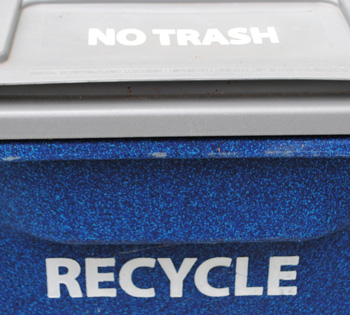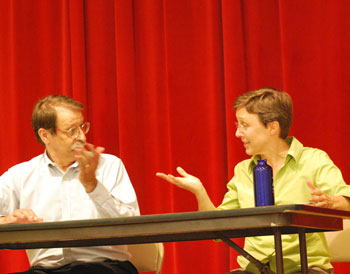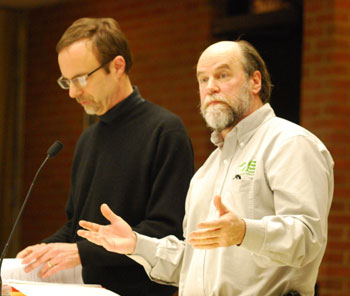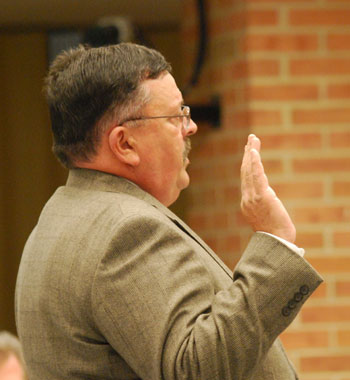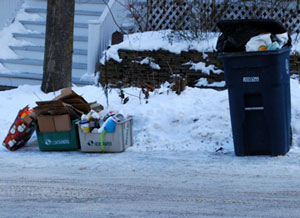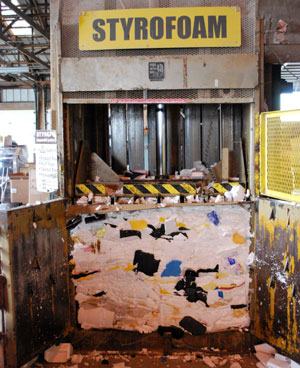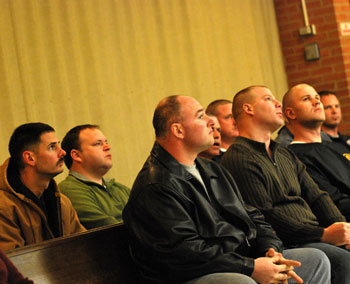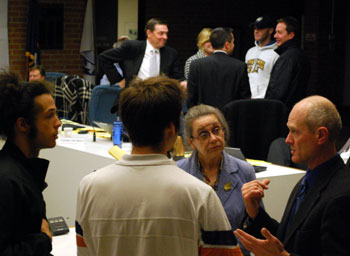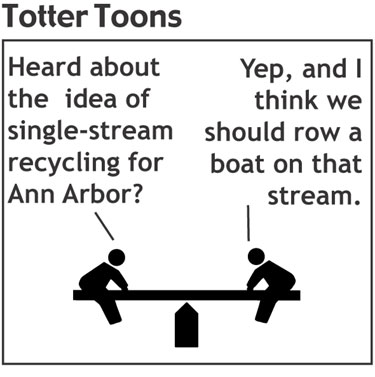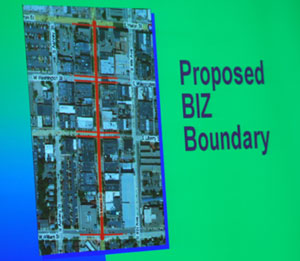Recycling, Yes for Now; Public Art, Postponed
Ann Arbor city council meeting (Sept. 19, 2011): The council’s agenda contained a raft of significant items, which could have easily pushed the meeting past midnight. But councilmembers maintained a brisk pace, postponing a few key issues that allowed them to wrap up the meeting in around four hours.
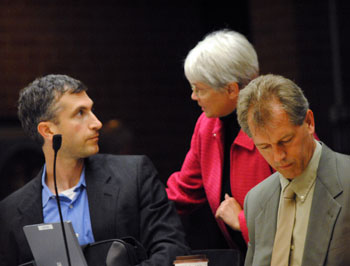
Christopher Taylor (Ward 3), Marcia Higgins (Ward 4), and Stephen Kunselman (Ward 3) before the city council's Sept. 19 meeting. (Photos by the writer.)
Public commentary was dominated by the theme of public art, with several people weighing in against a proposed change to the city ordinance setting aside 1% of all capital improvement projects for public art. One of the changes would exclude the use of funds generated by the street/sidewalk repair tax from inclusion in the public art program. Those taxes are on the Nov. 8 ballot.
The deliberations on the public art ordinance provoked some overt politicking at the table between Carsten Hohnke (Ward 5) and Stephen Kunselman (Ward 3), which concluded with Kunselman challenging his council colleagues to direct the city attorney to write a formal legal opinion justifying the legal basis for the public art program.
The proposed changes to the public art ordinance were motivated in part by a desire to assure voters that their street/sidewalk repair millage would not instead be spent on public art. However, the council postponed the public art ordinance revision until its second meeting in November – after the vote on the millage. That’s also well after the planned dedication ceremony for the Dreiseitl water sculpture on Oct. 4 – a project paid for with public art funds.
At its Monday meeting, the council also postponed a vote on a resolution of intent expressing the council’s plan for spending the sidewalk/millage money.
The council also considered a proposal to cancel a 10-year contract signed last year with RecycleBank, a company that provides a coupon-based incentive program for city residents to participate in the city’s recycling program. The data from the first year of the contract was not convincing to councilmembers that the RecycleBank program was having a positive impact.
However, councilmembers voted instead to direct city staff to negotiate towards a revised contract that RecycleBank had offered, which reduces RecycleBank’s fee by one-third.
The council approved a settlement with its police union, retroactively to 2009. The new contract is similar to those that other city unions have also settled on – including no wage increases, and pension and health care plans that require a greater contribution from employees than in the past. The city still has two unions (firefighters and police command officers) with contracts yet to be settled. Contracts with those unions will now have to conform to the requirements of new state legislation, effective Sept. 15, that limits the amount that the city can contribute to the health care costs of its employees.
Also related to police staffing, the council authorized the use of federal money to hire five police officers, if the city is awarded a grant for which it has applied.
In another employment-related issue, the council gave final approval to a revision to its retirement system, which lengthens the vesting period to 10 years and computes the final average compensation (FAC) based on five years instead of three.
Land use and property rights were a recurring theme throughout the meeting. Those items included: approval of the sale of a strip of city-owned downtown land to the Ann Arbor Transportation Authority; postponement of a request from a medical marijuana business for rezoning a parcel on South State Street; authorization of city staff to begin with the systematic annexation of township islands located within the city boundaries; and initiation of the process to levy a special assessment of Dexter Avenue property owners to fill in sidewalk gaps.
Items fitting the general category of economic development included a tax abatement for Picometrix, the setting of a tax abatement public hearing for Arbor Networks, and the expression of the council’s intent to establish a property assessed clean energy (PACE) district. The PACE program is a way for the city to offer loans to commercial property owners for the purpose of making energy improvements.
Among other items on the agenda, the council also passed a resolution calling on Gov. Rick Snyder not to sign legislation that would eliminate same-sex domestic partner benefits for public employees. [Full Story]




